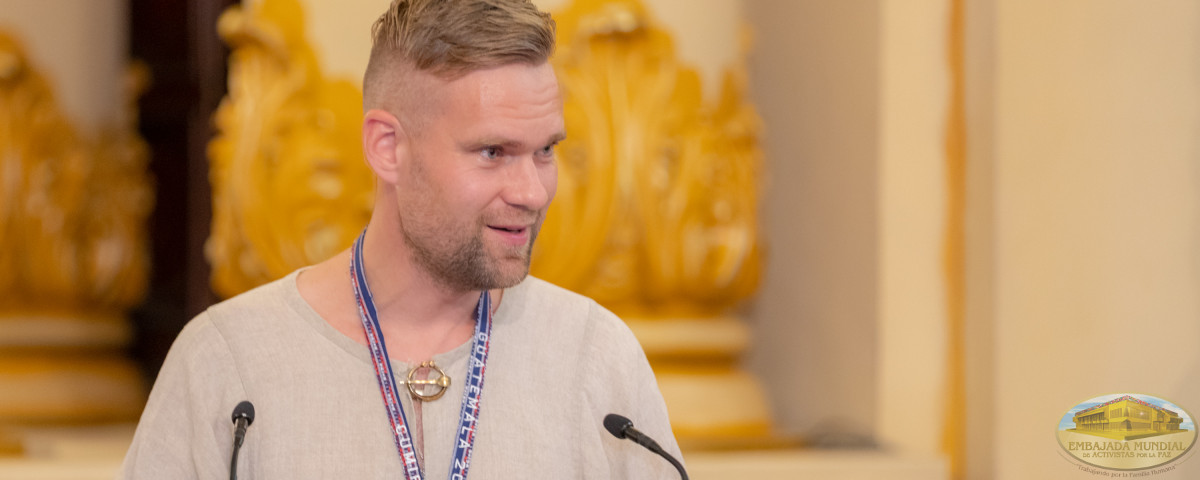Global Embassy of Activists for Peacehttps://embajadamundialdeactivistasporlapaz.com/sites/all/themes/emap_theme/logo.png

Dmitrii Kharakka-Zaitsev | Ceremony / Opening Science Session
Buenos días. Dear brothers and sisters, dear colleagues on behalf of United Nations Permanent Forum on Indigenous Issues and myself personally let me congratulate you with a high profile event.
The United Nations Declaration on Indigenous People Rights 2007 is a call of international principles of indigenous people rights it stipulates the minimal standards to be executed by authorities to preserve and support indigenous people.
Our, the Permanent Forum on Indigenous Issues pays a great attention to each area covered by this declaration. During its annual sessions we carefully examine negative and positive practices, which exist in certain member state. Also we work on in between the sessions. We work together with indigenous communities, non governmental organizations, united nations mechanisms and of course authorities and state institutions to find out the most effective measures to stop or evoke devaluations of non conformists and to develop and to improve the mechanisms which are already implemented, but we will never find the answer without hearing and listening indigenous people, their voices and their initiatives.
That is why such platforms as CUMIPAZand certainly this conference, is important for connecting indigenous people, academics, officials, to hear each other to put in to agenda the actual issues and to find out the compromises and solutions.
This is a dialogue which we will always need and which we will always must support. The last session of the Permanent Forum was dedicated to the problematic of the indigenous territories and different fears of indigenous life within these territories. The more tendencies always find their reflections in our final recommendations in our resolutions.
I would like to mention that taken into account the recommendations prepared by Permanent Forum members in 2016, United Nations General Assembly proclaimed the year of 2019 (so it’s the next year) as the International Year of Indigenous Languages. And I urge you and I call you to participate in the action plan for indigenous languages revitalization.
This is kind of reaction to the current situation. Unfortunately in many regions of the world we still observe disrespect for indigenous core values, we observe destruction of indigenous environment, window dressing activities, evasion of generally recognize principles and state *** introduced by national legislation.
We see manipulations and we see arrangement the conditions for assimilation. I regret that many of the state of authorities in any manner whatsoever forget their place and their role. They forgot why we have the state, why and for what reasons we have the government and its apparatus.
Now it is the time to reconsider the protest to reevaluate measures and to change the attitude in terms of indigenous people, their languages, cultures, natural and traditional resources, current and future lives. However, these changes a possible only with the authentic feeling of decision makers.
Permanent Forum always mentions that indigenous peoples are not the enemies, are not the enemies of the state, only because they are asking to exercise their rights. Indigenous peoples are the persons with active citizenship, they are stakeholders and human beings. It is necessary to remind the states that in jurisprudence, in the theory of law, there are two well determined legal constructions: crime of omission and criminal action. Omission is less visible but equally dangerous to such crimes as forced assimilation's, migration, genocide and ecocide.
During 20th century scholars all over the world have been making efficient efforts in indigenous languages status accumulating knowledge and linguistic data to preserve languages. Indigenous people sharing their knowledge with researchers in the hope that it will help the next generations to use the language, to preserve culture and to transfer the heritage young people for continuation of the life.
Nevertheless we see that many languages and many intangible heritage are well preserved in the scholars records, only in their records. While indigenous people living at their historical lengths suffer of lack of language teachers, absence of educational systems, inability to implement good practices in revitalization of languages.
They have to survive under the industrial pressure with the lack of access to their traditional natural resources such as forest, water, sea, land.
We shall meet the challenge and initiate practical and efficient actions together with indigenous people and the states to save or revitalize the languages and cultures in their living form.
I believe that the top priority in revitalization of indigenous languages and cultures at indigenous territories and within indigenous territories. This must include preservation of traditional cultures, social and ecological environment as an integral system. Only the systematic and comprehensive approach may help to achieve practical results.
Estimados señores y señoras, estimadas hermanas and hermanos: gracias por la invitación y por la oportunidad de participar en una conferencia de un nivel tan alto. Les deseo a todos un feliz y provechoso trabajo.
Gracias.
Details
Date:
access_time Mon, 10/01/2018 - 09:30
Related news:
Proyecto: